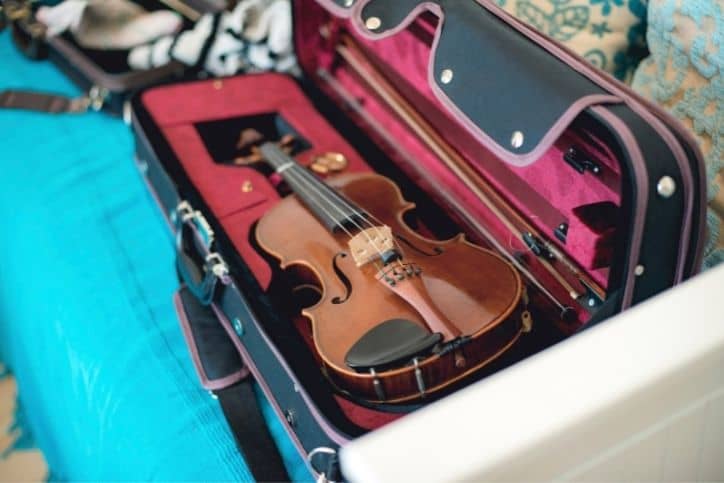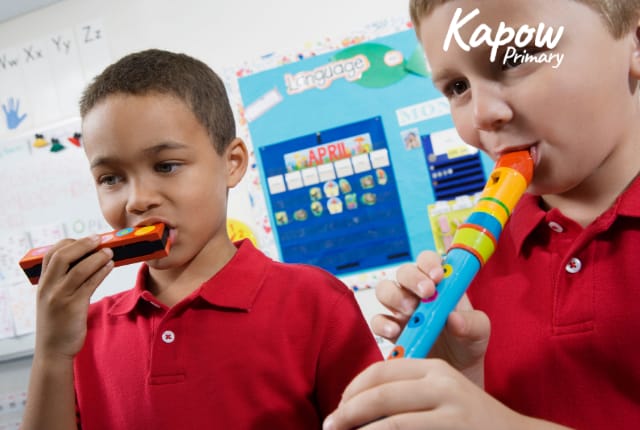Top Tips For Music Subject Leaders
Written by Kapow Primary
Published on 21st August 2019
Last Updated: 29th February 2024
Written by Kapow Primary
Published on 21st August 2019
Last Updated: 29th February 2024

If you’re not a music specialist – and even if you are – teaching music to primary age children can be something of a challenge, and a joy of course too. Seeing a child go from having no musical knowledge to playing or singing proficiently is one of the biggest rewards in teaching, and the health and wellbeing benefits of music to both children and adults are well known. The benefits can be seen on an academic level too, and this school in Bradford has seen incredible results after deciding to deliver 3 hours of music to its pupils every week.
For non-specialists, Music is something that is sometimes feared, but with the right support and training, you will quickly see the rewards both professionally and personally. It also gives you the opportunity to engage with pupils, who struggle in the more academic subjects, come into their own, succeed and enjoy.
If you are a non-Music specialist faced with the prospect of teaching Music this year, why not explore our Music scheme of work – and learn together with your pupils at your own pace? They do say that the best way to learn something new is to teach it to someone else – so you can learn a new skill and develop your practice at the same time.

For specialist Music teachers and Music coordinators, there are challenges too. It can be quite an isolating role as there are few or no other teachers to share knowledge and bounce ideas off. This can lead to quite a large planning burden on one person, which of course takes up a huge amount of time, both in work and beyond. Or perhaps you are new to the Music coordinator role, and have to ensure coverage across the school and just don’t know where to start? Coupled with this are the limited budgets available for training of both experienced and new Music subject leaders. So what do you do? That’s where we come in
To help you in your Music subject leader role, we have devised a brand new Music coordinator toolkit, packed full of useful resources to help you best perform in your role, and save time too. Don’t reinvent the wheel when it comes to putting together a plan for your new role, or creating a subject leader folder, we’ve done the hard work for you – and best of all, the toolkit is completely free – and created by experienced teachers just like you.
How do you know what support and training you need if you haven’t done a knowledge audit? Our Music subject knowledge audit will help you to identify the skills you already have, and pinpoint areas for development over the next 12 months and beyond. This can be used both for yourself and other teachers who are delivering Music to help you identify training needs as a whole school.
There’s nothing worse than wanting to teach a lesson and knowing the instruments are somewhere, but you just don’t know where exactly. That’s where our resources audit comes in. Take stock of what you already have in school, where things are stored, and what you need in the future. This also helps for succession planning should you change roles or move schools. Since musical equipment is so portable, it will help you keep a close eye on things all year.

Included in your toolkit is a comprehensive folder that can be printed and put into a lever arch file. This is the start of a file that you can use as evidence of your work on your subject – should anyone wish to see it!
This overview is really useful for seeing at a glance what should be covered by each year group to ensure progression of skills in Music – from year 1 to year 6. Print it out to keep in your subject leader file and use as your long term subject plan. Usefully, we have linked to our lesson plans and videos on the overview, so you can see how our Music scheme of work can link in to your overall curriculum.
Music can be a bit of a frightening prospect for some teachers. Debunk some myths around Music in a staff meeting with our staff meeting presentation PowerPoint. This is fully editable so you can personalise it to suit your teachers and school.
Some schools prefer to teach Music in the context of, or alongside, other subjects, which is understandable given the considerable burden on school timetables. We have provided a range of cross-curricular links and ideas so you can weave Music into other areas of school life – for even more enrichment opportunities.
Leading Music is a huge privilege and gives you the chance to see children at their best and most creative. Seeing children achieve musically is not only a challenge but a joy – and seeing the joy you will bring to children’s lives is not to be underestimated. Let us support you in your role.